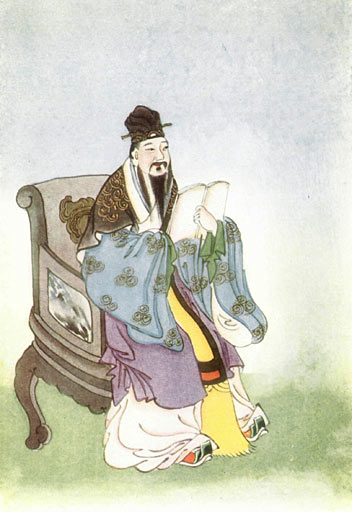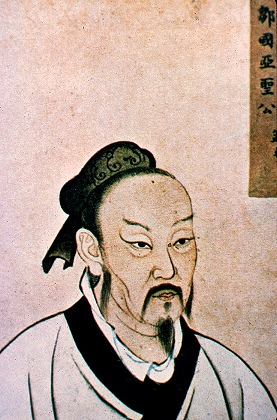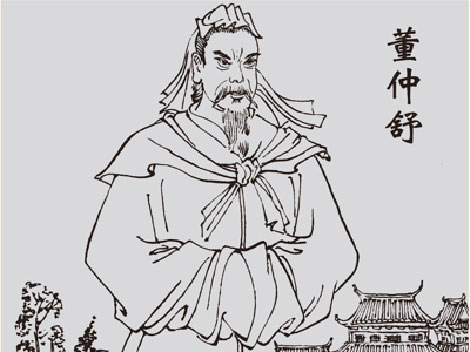<Back to Index>
- Philosopher Gaozi, 420 B.C.
- Philosopher Mencius (Meng Zi), 372 B.C.
- Scholar Dong Zhongshu, 179 B.C.
PAGE SPONSOR
Gaozi (Chinese: 告子; literally "Master Gao"; ca. 420 - 350 BCE), or Gao Buhai (告不害), was a Chinese philosopher during the Warring States Period. Gaozi's teachings are no longer extant, but he was a contemporary of Mencius (ca. 372 - 289 BCE), and most of our knowledge about him comes from the Mencius book titled "Gaozi".
Warring States philosophers disputed whether human nature is originally good (Mencius) or evil (Xunzi). The "Gaozi" chapter begins with a famous metaphor about a type of willow tree (qiliu (杞柳)). (Qi was also an ancient place name, best known through the four - character idiom qirenyoutian [杞人憂天, "person from Qi who worried heaven might fall"] "groundless fears; superfluous worry".)
The philosopher [Gao] said, 'Man's nature is like the [qi] - willow, and righteousness is like a cup or a bowl. The fashioning benevolence and righteousness out of man's nature is like the making cups and bowls from the [qi] - willow.'
Mencius replied, 'Can you, leaving untouched the nature of the willow, make with it cups and bowls? You must do violence and injury to the willow, before you can make cups and bowls with it. If you must do violence and injury to the willow in order to make cups and bowls with it, on your principles you must in the same way do violence and injury to humanity in order to fashion from it benevolence and righteousness! Your words, alas! would certainly lead all men on to reckon benevolence and righteousness to be calamities.'
The philosopher [Gao] said, 'Man's nature is like water whirling round in a corner. Open a passage for it to the east, and it will flow to the east; open a passage for it to the west, and it will flow to the west. Man's nature is indifferent to good and evil, just as the water is indifferent to the east and west.'
Mencius replied, 'Water indeed will flow indifferently to the east or west, but will it flow indifferently up or down? The tendency of man's nature to good is like the tendency of water to flow downwards. There are none but have this tendency to good, just as all water flows downwards. Now by striking water and causing it to leap up, you may make it go over your forehead, and, by damming and leading it you may force it up a hill - but are such movements according to the nature of water? It is the force applied which causes them. When men are made to do what is not good, their nature is dealt with in this way.'


Mencius (Chinese: 孟子; pinyin: Mèng Zǐ; most accepted dates: 372 – 289 BCE; other possible dates: 385 – 303 / 302 BCE) was a Chinese philosopher who was arguably the most famous Confucian after Confucius himself.
Mencius, also known by his birth name Meng Ke or Ko, was born in the State of Zou, now forming the territory of the county level city of Zoucheng (originally Zouxian), Shandong province, only thirty kilometers (eighteen miles) south of Qufu, Confucius' birthplace.
He was an itinerant Chinese philosopher and sage, and one of the principal interpreters of Confucianism. Supposedly, he was a pupil of Confucius' grandson, Zisi. Like Confucius, according to legend, he traveled China for forty years to offer advice to rulers for reform. During the Warring States Period (403 – 221 BCE), Mencius served as an official and scholar at the Jixia Academy in the State of Qi (1046 BCE to 221 BCE) from 319 to 312 BCE. He expressed his filial devotion when he took an absence of three years from his official duties for Qi to mourn his mother's death. Disappointed at his failure to affect changes in his contemporary world, he retired from public life.
Mencius is buried in the "Mencius Cemetery" (孟子林, Mengzi Lin, also known as 亚圣林, Yasheng Lin), which is located 12 km to the northeast of Zoucheng's central urban area. A stele carried by a giant stone tortoise and crowned with dragons stands in front of his grave.
Mencius' mother is often held up as an exemplary female figure in Chinese culture. One of the most famous traditional Chinese four - character idioms is 孟母三遷 (mèng mǔ sān qiān; literal translation: "Mencius' mother, three moves").
This saying refers to the legend that Mencius' mother moved house three times before finding a location that she felt was suitable for the child's upbringing. As an expression, the idiom refers to the importance of finding the proper environment for raising children.
Mencius's father died when he was very young. His mother Zhang (仉) raised her son alone. They were very poor. At first they lived by a cemetery, where the mother found her son imitating the paid mourners in funeral processions. Therefore the mother decided to move. The next house was near a market in the town. There the boy began to imitate the cries of merchants (merchants were despised in early China). So the mother moved to a house next to a school. Inspired by the scholars and students, Mencius began to study. His mother decided to remain, and Mencius became a scholar.
Another story further illustrates the emphasis that Mencius' mother placed on her son's education. As the story goes, once when Mencius was young, he was truant from school. His mother responded to his apparent disregard for his education by taking up a pair of scissors and cutting the cloth she had been weaving in front of him. This was intended to illustrate that one cannot stop a task midway, and her example inspired Mencius to diligence in his studies.
She is one of 125 women of which biographies have been included in the Lienü zhuan, written by Liu Xiang.
Mencius'
interpretation of Confucianism has generally been considered the
orthodox version by subsequent Chinese philosophers, especially by the Neo - Confucians of the Song dynasty. Mencius' disciples included a large number of feudal lords, and he was actually more influential than Confucius had been. The Mencius (also spelled Mengzi or Meng-tzu), a book of his conversations with kings of the time, is one of the Four Books that Zhu Xi grouped
as the core of orthodox Neo - Confucian thought. In contrast to the
sayings of Confucius, which are short and self - contained, the Mencius consists of long dialogues, including arguments, with extensive prose.
While Confucius himself did not explicitly focus on the subject of human nature, Mencius asserted the innate goodness of the individual, believing that it was society's influence – its lack of a positive cultivating influence – that caused bad moral character. "He who exerts his mind to the utmost knows his nature" and "the way of learning is none other than finding the lost mind".
His translator James Legge finds a close similarity between Mencius' views on human nature and those in Bishop Butler's Sermons on Human Nature.
To show innate goodness, Mencius used the example of a child falling down a well. Witnesses of this event immediately feel
| “ | alarm
and distress, not to gain friendship with the child's parents, nor to
seek the praise of their neighbors and friends, nor because they dislike
the reputation [of lack of humanity if they did not rescue the
child]... The feeling of commiseration is the beginning of humanity; the feeling of shame and dislike is the beginning of righteousness; the feeling of deference and compliance is the beginning of propriety; and the feeling of right or wrong is the beginning of wisdom. Men have these Four Beginnings just as they have their four limbs. Having these Four Beginnings, but saying that they cannot develop them is to destroy themselves. | ” |
Human nature has an innate tendency towards goodness, but moral rightness cannot be instructed down to the last detail. This is why merely external controls always fail in improving society. True improvement results from educational cultivation in favorable environments. Likewise, bad environments tend to corrupt the human will. This, however, is not proof of innate evil because a clear thinking person would avoid causing harm to others. This position of Mencius puts him between Confucians such as Xunzi who thought people were innately bad, and Taoists who believed humans did not need cultivation, they just needed to accept their innate, natural, and effortless goodness. The four beginnings / sprouts could grow and develop, or they could fail. In this way Mencius synthesized integral parts of Taoism into Confucianism. Individual effort was needed to cultivate oneself, but one's natural tendencies were good to begin with. The object of education is the cultivation of benevolence, otherwise known as Ren.
According to Mencius, education must awaken the innate abilities of the human mind. He denounced memorization and advocated active interrogation of the text, saying, "One who believes all of a book would be better off without books" (尽信书,则不如无书, from 孟子.尽心下). One should check for internal consistency by comparing sections and debate the probability of factual accounts by comparing them with experience.
Mencius
also believed in the power of Destiny in shaping the roles of human
beings in society. What is destined cannot be contrived by the human
intellect or foreseen. Destiny is shown when a path arises that is both
unforeseen and constructive. Destiny should not be confused with Fate.
Mencius denied that Heaven would protect a person regardless of his
actions, saying, "One who understands Destiny will not stand beneath a
tottering wall". The proper path is one which is natural and unforced.
This path must also be maintained because, "Unused pathways are covered
with weeds." One who follows Destiny will live a long and successful
life. One who rebels against Destiny will die before his time.
Mencius emphasized the significance of the common citizens in the state. While Confucianism generally regards rulers highly, he argued that it is acceptable for the subjects to overthrow or even kill a ruler who ignores the people's needs and rules harshly. This is because a ruler who does not rule justly is no longer a true ruler. Speaking of the overthrow of the wicked King Zhou of Shang, Mencius said, "I have merely heard of killing a villain Zhou, but I have not heard of murdering [him as] the ruler."
This saying should not be taken as an instigation to violence against authorities but as an application of Confucian philosophy to society. Confucianism requires a clarification of what may be reasonably expected in any given relationship. All relationships should be beneficial, but each has its own principle or inner logic. A Ruler must justify his position by acting benevolently before he can expect reciprocation from the people. In this view, a King is like a steward. Although Confucius admired Kings of great accomplishment, Mencius is clarifying the proper hierarchy of human society. Although a King has presumably higher status than a commoner, he is actually subordinate to the masses of people and the resources of society. Otherwise, there would be an implied disregard of the potential of human society heading into the future. One is significant only for what one gives, not for what one takes.
His alleged years make him contemporary with Xun Zi, Zhuangzi, Gaozi, and Plato.
Xun Zi was a Confucian who believed that human nature is originally bad, and the purpose of moral cultivation is to develop our nature into goodness. Obviously, Mencius was at odds with him. Zhu Xi declared his views to be unorthodox, supporting Mencius' stance that human nature is inherently good.
Mencius' argument that unjust rulers may be overthrown is reminiscent of Socrates' argument in Book I of Plato's Republic.


Dong Zhongshu (Chinese: 董仲舒; 179 – 104 BC) was a Han Dynasty Chinese scholar. He is traditionally associated with the promotion of Confucianism as the official ideology of the Chinese imperial state.
Dong was born in modern Hengshui, Hebei in 179 BCE. He entered the imperial service during the reign of Emperor Jing of Han and rose to high office under Emperor Wu of Han. His relationship with the emperor was uneasy though. At one point he was thrown into prison and nearly executed for writings that were considered seditious, and he may have cosmologically predicted the overthrow of the Han Dynasty and its replacement by a Confucian sage, the first appearance of a theme that would later sweep Wang Mang to the imperial throne.
Dong Zhongshu's thought integrated Yin Yang cosmology into a Confucian ethical framework. He emphasized the importance of the Spring and Autumn Annals as a source for both political and metaphysical ideas, following the tradition of the Gongyang Commentary in seeking hidden meanings from its text. He is also considered the originator of the doctrine of Interactions Between Heaven and Mankind, which lays down rules for deciding the legitimacy of a monarch as well as providing a set of checks and balances for a reigning monarch.
There are two works that are attributed to Dong Zhongshu, one of which is the Ju Xianliang Duice in three chapters, preserved under the Book of Han. Another of his major works that has survived to the present is the Luxuriant Dew of the Spring and Autumn Annals in 82 chapters. The Luxuriant Dew of the Spring and Autumn Annals bears many marks of multiple authorship. Whether the work was written by Dong himself has been called into question by several scholars including Zhu Xi, Cheng Yanzuo, Dai Junren, Keimatsu Mitsuo, and Tanaka Masami. Scholars now reject as later additions all the passages that discuss five elements theory, and much of the rest of the work is questionable as well. It seems safest to regard it as a collection of unrelated or loosely related chapters and shorter works, which could be subdivided into five categories. Most are more or less connected to the Gongyang Commentary and its school and written by a number of different persons at different times throughout the Han Dynasty.
Other important sources for Dong Zhongshu's life and thought include his poem The Scholar's Frustration, his biography included in the Book of Han, his Yin Yang and stimulus - response theorizing noted at various places in the Book of Han "Treatise on the Five Elements," and the fragments of his legal discussions.